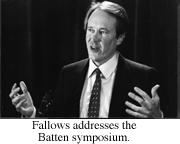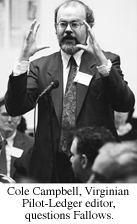Summer 1996
The Puff Adder’s Nest of Modern Journalism
The 1996 James K. Batten Symposium on Excellence in Civic Journalism
Symposium Keynote Speaker
James Fallows
Breaking the News, How the Media Undermine American Democracy
Washington Editor, The Atlantic Monthly
When I first heard about the public/civic journalism movement, I was impressed with the similarity of spirit between the critique it offered and what the defense reformers had been trying to do. I believe, now, that there will be a further similarity: Public journalism will triumph (like the defense reformers did) when people stop using the label and just incorporate the ideas.
Two years ago I had never heard the term public journalism. I came across it only during the research of my recent book. I already had a very clear sense of what was wrong with modern journalism. I thought it was also important to listen to people with ideas about correcting what was wrong. I ended up meeting with people in the public journalism movement, including a number in this room. What struck me is that they were trying seriously to come up with new ideas. They had a clear-eyed sense of where mainstream journalists had broken down. More important, they were — very much like the defense reformers — willing to experiment, criticize, and think freely to come up with possibilities of better ideas.
Not all their ideas were brilliant or practical, and they did not agree among themselves on every point. But unlike so many leading journalists, who smugly told themselves that the blame for tawdry journalism lay solely with a tawdry-minded public, these journalistic reformers were saying: Let’s find new ways to deal with the fundamental problems that seem to be driving us away from our audience, from our public, and from the causes that originally brought us into that business. I tried in the final chapter of Breaking the News to explain that perspective.
Little did I imagine that would be by far the most controversial and criticized aspect of my argument. I don’t mean criticism by “civilian” readers outside the journalism business. I am referring only to in-house criticism from the most powerful institutional voices of our business — the editors and retired editors of our leading papers, those who view their duty as safeguarding journalism’s independence.

I had expected many of them to receive the public journalism concept as I did — as a source of varied, potentially valuable suggestions for rejuvenating our craft.
You can imagine my surprise to find that this is sort of the puff adder’s nest of modern journalism, where you stick your hand in and the puff adders come out from all corners of the swamp.
I’ve had many occasions in the last few months to speculate on the origins of this hostility. It has all the marks, by the way, of a reflex action, rather than a reasoned counter-argument. My purpose today is to suggest some of the sources of the reaction and the ways it might abate.
In fairness to the critics, we should start with the most serious and weighty objections to public journalism — the worst excesses that can be committed in public journalism’s name.
First is a genuine suspicion about projects done for fundamentally commercial reasons, which are then decorated with a “public journalism” label. Publishers and marketing directors have since time immemorial looked for ways to promote their product. In some papers, public journalism is being used as this week’s gimmick and is not much more serious than the two-for-one coupons or other gimmicks used the week before. Everyone in this room would agree that this is not what we mean by the promise of public journalism.
A second genuine fear is a slippery-slopeism when it comes to local political causes. In many towns for many years it has been all too common for the newspaper publisher to be a big figure in local politics and commerce. Having defined journalistic integrity as the struggle to move away from such complications, many journalists fear that public journalism will push them right back into the cozy, log-rolling habits of the old days. All of us should concede this as a possible harmful abuse of the movement.
A third complaint is harder for the complainants to defend on purely logical grounds, but it obviously has great emotional appeal. This is a larger concept of slippery-slopeism involving government as a whole.
A number of people have used my own history as a cautionary example, so I should address it here. With every person in this room, I believe in the First Amendment, in a press that is uncontrolled by government, and in a press that is structurally and emotionally separate from government. And I believe that part of our duty is to point out what is going wrong with government, in keeping with our place in the check-and-balance system.
But I do not believe that we must always view government as an evil enterprise — as vice-squad agents would view the drug trade — as something that will taint us forever if we have any contact with it. On the contrary, I have always believed it is good for journalists, once in their lives, to have first-hand experience in some of the fields they are going to cover. I say “one-time” because I recognize the danger in “commuting.” If you are going back and forth from one realm to the other, people may be suspicious of you in either guise. Are you angling to get a government appointment through your writing as a reporter? Are you storing up journalistic tidbits during the time you’re working inside?
I am actively proud that for one period of my life — two years, out of the 24 years since I left graduate school — I worked in the government. Yet the excessive sense of separation between journalism and government is such that some critics of public journalism think that the whole movement represents the takeover of free journalistic inquiry by representatives of the State. Everyone would recognize that people who have served as soldiers will know something extra when they report on the military — but are not likely to turn into lifetime stooges of the military. Critics of public journalism have acted as if they believe that journalists face an all-or-nothing choice: Either we are entirely separate from and hostile to government in all its forms, or else we are its lackeys. Reality is more complicated, and so should our view of our public responsibility be.

The fourth, related critique of public journalism is that it means surrender of all critical power. If you are a “public” journalist, you are there only to provide good news. By implication your role is to serve the convenience of people running public and private power centers. If, on the other hand, you are a “real” journalist, then you are honestly serving your readers’ interests without letting any outside agenda intrude.
Given this choice, most people would agree that public journalism sounds terrible. But I think this choice wildly misstates the relevant realities – of public journalism and of today’s “real” journalism too. Public journalism theorists have been careful to disavow any instrumental political goal. They are not operating either to help or hurt Clinton. They are not operating either to help or hurt the Republican cause. They do, however, find it acceptable to be biased in favor of political participation – and therefore to judge their efforts at least partly by whether they make citizens feel more rather than less enfranchised as they view public affairs.
In keeping with this logic, the public journalism crowd recognizes that journalism is protected by the Constitution because it was seen as an indispensable element of democracy. If its performance falters — if the public does not grasp fundamental news of the day — then the press bears at least part of that blame. If, for example, the public thinks that foreign aid costs as much as Social Security does (rather than about one per cent as much), or if people don’t know that Medicare is run by the government, we in the press bear part of the responsibility. So do the teachers, and the politicians, and members of the public itself — but we are not exempt.
Of course, the idea that today’s press functions as a purely neutral observer has very little to do with the way the press actually functions. Anyone who has seen any level of government knows how deeply its actions are conditioned every day by what reporters and editors decide to print. So the idea that we can just view public life from afar, as many people contend, I think is not correct.
This is my best attempt to understand the reaction to the suggestions made by public journalists. Do I think they can be addressed by reason, example, or explanation? No. Some ideas just seem to be beyond argument, and I’ve come to the conclusion that the theory of public journalism is one of them.
However, one strange fact coincides with this observation. If we stop talking about the theory, and just concentrate on the projects done in the name of public journalism, the reality is that 99 per cent of all journalists will agree on which are good and which are bad. The prizes being awarded today are a perfect example. I defy you to find any “real” journalist, anyone who has denounced public journalism in a column or review, who would be unhappy with these projects. They wouldn’t say: This was lazy. This was log-rolling. This meant dropping our critical independence. They would say, instead, this is good journalism. And that gives us our starting point.
At this stage in journalistic debates it is clear that people will disagree on theory and rhetoric — but can agree on many specifics. We should act on that knowledge, with this three-part plan.
First, people who support public journalism should be the first to complain when the label is misused. If it’s just a gimmick run by the advertising department, if it’s used to promote chums of the publisher, we should point out these problems before anyone else does.
Number two, emphasize less the theory of this movement than its specifics. Lead with these prize-winning entries and everybody will admire you. Talk about civic journalism and they’ll run shrieking from the room.
Third, we should recognize that this battle will be won when people stop talking about “civic” or “public” journalism. When they start talking about “journalism” again — journalism we can admire, journalism that engages the public — they will probably have built in the concepts you all have been developing for years. Then your struggle will have succeeded, and the nation will be grateful, and so will I.
